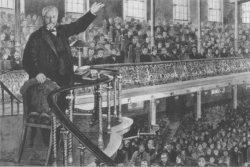 “Upon a life I did not live, another’s death, I stake my whole eternity.” – Horatius Bonar
“Upon a life I did not live, another’s death, I stake my whole eternity.” – Horatius Bonar
“The Bible has no comfort whatsoever to give to people who are not Christians – none at all; indeed the exact opposite. The Bible has nothing to say to such people except to warn them to flee from the wrath to come. It tells them that the sufferings of this present hour are not worthy to be compared with the sufferings they are going to endure, that these are but a foretaste of what is coming to them, that the account of the Flood, the destruction of Sodom and Gomorrah, and all similar calamities are but faint pictures of the suffering that is going to come to those who do not belong to the Lord Jesus Christ. There is no comfort here for an unbeliever – none at all.” – Dr. Martyn Lloyd-Jones (Romans – The Perseverance Of The Saints)
“When you arrive in heaven, I wonder if Christ might say, ‘Because of you, others are here today. Wanna meet ’em?'” – Max Lucado
“God has clothed His thoughts in words, and there is no way to know Him except by knowing the Scriptures.” – John Stott
The word of God is “God’s powerful, authoritative self-expression… the word is the very presence of God among us, the place where God dwells. So you cannot separate the word of God from God himself.” – John Frame, in Salvation Belongs To The Lord
“All the heresies which have arisen in the Christian Church have had a decided tendency to dishonor God and to flatter man.” – C. H. Spurgeon
“The Gospel hinges on human sinfulness and confusing sin undermines the gospel.” – Dr. Al Mohler
“Natural man’s sin is precisely this: He wants the benefits of God without God Himself.” – R. C. Sproul
“A fanatic is one who can’t change his mind and won’t change the subject.” – Winston Churchill
“A pessimist sees the difficulty in every opportunity;an optimist sees the opportunity in every difficulty.” – Winston Churchill
“The Law makes sinners, but the Gospel takes sinners & declares them to be saints, holy & righteous through faith in Jesus Christ.” – Pless
“There are many preachers who never preach justification by faith at all, because they do not believe it. They regard the New Testament message as no more than an ethical system, and they are always exhorting people to live better lives, and to stop doing this and that. They apply this in a more general sphere, and so are always making protests to Governments and other powers. They talk unceasingly about applying the Christian ethic… we can say without any hesitation that such men are not preaching the Gospel.” Martyn Lloyd-Jones (Romans – The New Man)
“So exceeding great are the matters of eternity, that nothing in this world deserveth once to be named in comparison with them, nor can any earthly thing, though it were life, or crowns and kingdoms, be a reasonable excuse for matters of so high and everlasting consequence. A man can have no reason to cross his ultimate end. Heaven is such a thing, that if you lose it, nothing can supply the want, or make up the loss. And hell is such a thing, that if you suffer it, nothing can remove your misery, or give you ease and comfort. And therefore nothing can be a valuable consideration to excuse you for neglecting your own salvation.” – Richard Baxter
“Oh, my brethren! bold-hearted men are always called mean-spirited by cowards. You and I cannot be useful if we want to be sweet as honey in the mouths of men. God will never bless us if we wish to please men, that they may think well of us. Are you willing to tell them what will break your own heart in the telling and break theirs in the hearing? If not, you are not fit to serve the Lord. You must be willing to go and speak for God, though you will be rejected. Opposers will call your determination obstinacy; but never mind, your firmness is the stuff of which martyrs are made. In a wrong case, a strong will creates incorrigible rebels; but if it be sanctified, it gives great force to character, and steadfastness to faith.” – C. H. Spurgeon
We shall grow in grace, but we shall never be more completely pardoned than when we first believed: we shall one day stand before the glorious presence of God in his own sacred courts, and see the Well-beloved and wear his likeness, but we shall not even then be more perfectly forgiven than we are at this present moment. – C. H. Spurgeon
“The Lord does not shine on us, except when we take his word as our light.” – John Calvin
“Once you know the truth, this means following it, upholding it, and if necessary suffering for it.” – Aida Skripnikova
“I want you to look for a moment. Just listen to this in 2 Corinthians 7:9-10. Listen to what Paul says. “I now rejoice not that you were made sorrowful but that you were made sorrowful to the point of genuine repentance.” Paul says, “I am glad that you saw your sin. I am glad that it created sorrow in you for this reason: It caused you to turn back to God. And then he goes on and says – listen this is very important “For you were made sorrowful” – now listen to this – “according to the will of God.” It was God’s will to make you sorrowful. Literally it can be translated this way: You were made sorrowful according to God. It was God’s doing.
I remember preaching one time, and as I was preaching, at about the middle of the sermon, people started weeping – just all over the congregation. And they just started coming forward, and they’re crying, and the leader of the counselors kept looking at me like “Shouldn’t we come forward and help them?” And I said, “No.” And then I realized they were going to do it anyway, so I went down and I stopped them. And this is what I told them. I said, “Don’t you touch the ark of God. Don’t you try to comfort people that God Himself is wounding.” God must wound you. There must be a crisis. In order to be saved, you must come to grips with who He is and what you are and the heinous nature of sin, the sinfulness of sin. In order for you to come to Christ and see Him as precious. But even after your conversion, there is a sense in which sorrow and mourning should be Biblical and should continue.” – Paul Washer
John Calvin, writing in the preface to Pierre-Robert Olivétan’s 1535 translation of the New Testament:
He [Christ] is Isaac, the beloved Son of the Father who was offered as a sacrifice, but nevertheless did not succumb to the power of death.
He is Jacob the watchful shepherd, who has such great care for the sheep which he guards.
He is the good and compassionate brother Joseph, who in his glory was not ashamed to acknowledge his brothers, however lowly and abject their condition.
He is the great sacrificer and bishop Melchizedek, who has offered an eternal sacrifice once for all.
He is the sovereign lawgiver Moses, writing his law on the tables of our hearts by his Spirit.
He is the faithful captain and guide Joshua, to lead us to the Promised Land.
He is the victorious and noble king David, bringing by his hand all rebellious power to subjection.
He is the magnificent and triumphant king Solomon, governing his kingdom in peace and prosperity.
He is the strong and powerful Samson, who by his death has overwhelmed all his enemies.
This is what we should in short seek in the whole of Scripture: truly to know Jesus Christ, and the infinite riches that are comprised in him and are offered to us by him from God the Father. If one were to sift thoroughly the Law and the Prophets, he would not find a single word which would not draw and bring us to him… Therefore, rightly does Saint Paul say in another passage that he would know nothing except Jesus Christ, and him crucified.

 Sam Storms is lead pastor for preaching and vision at Bridgeway Church in Oklahoma City, I can’t recall ever hearing anything about a “millennial” kingdom, much less the variety of theories regarding its meaning and relationship to the second coming of Christ. Like many of my generation, my initial exposure to biblical eschatology was in reading Hal Lindsey’s Late Great Planet Earth during the summer of 1970.
Sam Storms is lead pastor for preaching and vision at Bridgeway Church in Oklahoma City, I can’t recall ever hearing anything about a “millennial” kingdom, much less the variety of theories regarding its meaning and relationship to the second coming of Christ. Like many of my generation, my initial exposure to biblical eschatology was in reading Hal Lindsey’s Late Great Planet Earth during the summer of 1970. Dr. Daniel Wallace three come to mind: (1) If Matthew and Luke swallowed up Q in their writings, why would we expect to find any copies of Q? Or to put this another way, Luke says that he used more than one source, presumably more than one written source. If so, why haven’t we found it/them? The fact that we haven’t surely doesn’t mean that Luke was not shooting straight with us, does it? (2) Even the Gospel of Mark has few copies in the early centuries, yet it was endorsed as an official Gospel by Ireneaus. Yet this is a canonical Gospel, which apparently was regarded in some sense as authoritative before the end of the first century, or at the latest in the first decade or two of the second century, because of its association with Peter. Yet if there are only two copies of Mark in Greek before the fourth century still in existence (at least as far as what has been published to date), what chance do we have of finding a non-canonical gospel-source in the early centuries? And as the centuries roll on, the likelihood that such a document would continue to be copied becomes increasingly remote. (3) Apart from having the text of Q, as it has been reconstructed, what other criteria should scholars demand of such an alleged discovery? Do they expect the document to have a title such as “The Gospel according to Q”? That neologism won’t wash. Perhaps just such manuscripts have been discovered but were mislabeled. The burden of this short essay is to examine that possibility.
Dr. Daniel Wallace three come to mind: (1) If Matthew and Luke swallowed up Q in their writings, why would we expect to find any copies of Q? Or to put this another way, Luke says that he used more than one source, presumably more than one written source. If so, why haven’t we found it/them? The fact that we haven’t surely doesn’t mean that Luke was not shooting straight with us, does it? (2) Even the Gospel of Mark has few copies in the early centuries, yet it was endorsed as an official Gospel by Ireneaus. Yet this is a canonical Gospel, which apparently was regarded in some sense as authoritative before the end of the first century, or at the latest in the first decade or two of the second century, because of its association with Peter. Yet if there are only two copies of Mark in Greek before the fourth century still in existence (at least as far as what has been published to date), what chance do we have of finding a non-canonical gospel-source in the early centuries? And as the centuries roll on, the likelihood that such a document would continue to be copied becomes increasingly remote. (3) Apart from having the text of Q, as it has been reconstructed, what other criteria should scholars demand of such an alleged discovery? Do they expect the document to have a title such as “The Gospel according to Q”? That neologism won’t wash. Perhaps just such manuscripts have been discovered but were mislabeled. The burden of this short essay is to examine that possibility. Recently someone asked me what I thought of the Alpha Course. For those unfamiliar with Alpha, it is a course that started in a local Church (Holy Trinity Brompton) in the United Kingdom, that under the leadership of Nicky Gumbel, has been used throughtout the world to draw hundreds of thousands of the unchurched to hear presentations about Christianity. There is no doubt that the course has been distributed widely. Actually that is a huge understatement. It has had phenomenal influence in many surprising places. However, for all that may be very praiseworthy about Alpha, the omission of the biblical gospel, renders it, in my opinion, merely an “almost Christian” or “pre-Christian” course.
Recently someone asked me what I thought of the Alpha Course. For those unfamiliar with Alpha, it is a course that started in a local Church (Holy Trinity Brompton) in the United Kingdom, that under the leadership of Nicky Gumbel, has been used throughtout the world to draw hundreds of thousands of the unchurched to hear presentations about Christianity. There is no doubt that the course has been distributed widely. Actually that is a huge understatement. It has had phenomenal influence in many surprising places. However, for all that may be very praiseworthy about Alpha, the omission of the biblical gospel, renders it, in my opinion, merely an “almost Christian” or “pre-Christian” course. The indicative informs us of an accomplished fact. For example, “He made peace by the blood of His cross.” On the other hand, the imperative is a command or direction. In Ephesians 4:32, Paul gives us this command: “Be kind to one another, tenderhearted, forgiving one another.”
The indicative informs us of an accomplished fact. For example, “He made peace by the blood of His cross.” On the other hand, the imperative is a command or direction. In Ephesians 4:32, Paul gives us this command: “Be kind to one another, tenderhearted, forgiving one another.” “Upon a life I did not live, another’s death, I stake my whole eternity.” – Horatius Bonar
“Upon a life I did not live, another’s death, I stake my whole eternity.” – Horatius Bonar Josh is a student at Reformed Theological Seminary, Washington DC and a member of Covenant Reformed Baptist Church, Warrenton, VA. I thought this short article he wrote regarding the Presidential Inauguration Prayer debacle
Josh is a student at Reformed Theological Seminary, Washington DC and a member of Covenant Reformed Baptist Church, Warrenton, VA. I thought this short article he wrote regarding the Presidential Inauguration Prayer debacle  Are you afraid that preaching the gospel will not win souls? Are you despondent as to success in God’s way? Is this why you pine for clever oratory? Is this why you must have music, and architecture, is it by might and power, and not by the Spirit of God? It is even so in the opinion of many.
Are you afraid that preaching the gospel will not win souls? Are you despondent as to success in God’s way? Is this why you pine for clever oratory? Is this why you must have music, and architecture, is it by might and power, and not by the Spirit of God? It is even so in the opinion of many.